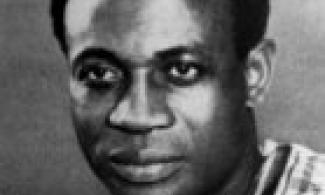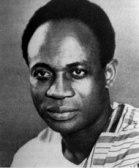
Jan. 10 (GIN) – As feared, Ghana’s oil facilities are being sold to the highest bidder following the discovery of the precious substance over the past decade. This week it was reported that a Floating Production Storage Offloading vessel – named Kwame Nkrumah – was sold to a consortium of oil dealers, mostly American.

Jan. 10 (GIN) – As feared, Ghana’s oil facilities are being sold to the highest bidder following the discovery of the precious substance over the past decade. This week it was reported that a Floating Production Storage Offloading vessel – named Kwame Nkrumah – was sold to a consortium of oil dealers, mostly American.
The ship is valued at $750 million, the news agency reported,
Although Ghana has a piece of the Jubilee consortium, it has a mere 13% compared to 23% for partner Kosmos Energy, 23% for Anadarko Petroleum Corporation , 36% for Tullow Oil plc and 3% for Sabre Oil & Gas Holdings Ltd.
In a related development, Samuel Okudjato Ablakwa in the Information Ministry, acknowledged that Ghana’s debt payment between 2009 and 2011 (642 million Ghana cedis) exceeded oil revenues of 506 million cedis. Analysts on the website Ghana Oil Info concluded: “the nation has not benefited from its oil find since all revenue it derived was used to compensate individuals and companies… Irrespective of how bright the oil industry looks, there will be no significant economic benefit to the local population if this situation persists.”
The Kwame Nkrumah can process 120,000 barrels of oil per day and has storage capacity of 1.6 million barrels. It was not known at press time whether the new owners would re-name the vessel.
Meanwhile, a feud is simmering between Ghana and neighbor Ivory Coast over that country’s claims to some of Ghana’s jubilee oil fields. A new maritime board mapped out by President Allasane Ouattara justifies the claim to the fields which hold about a billion-barrel discoveries. w/pix of K. Nkrumah, first prime minister of Ghana.
.jpg) Life Of Congolese Nationalist Leader And First President Recalled
Life Of Congolese Nationalist Leader And First President Recalled
Jan. 10 (GIN) - Fifty one years ago on Jan. 17, Patrice Lumumba, the leader of the anti-colonial struggle in the Congo and its first democratically-elected prime minister, was murdered by a firing squad aided and abetted by the United States and Belgium. He was 35.
For speaking out against colonialism, for pan-Africanism and against the brutality of the Belgian colonizers who took over the country in 1908, Lumumba and two of his associates, Maurice Mpolo and Joseph Okito, died a gruesome death. They were gunned down one by one, while tied to trees. When questions surfaced over the official version of Lumumba’s death―that he had been killed by enraged villagers after attempting to escape―the Belgians returned, exhumed the bodies, hacked them up, dissolved them in acid, keeping as souvenirs Lumumba’s teeth and bullets removed from his body.
Belgium ruled the Congo until 1960. Today the country is named the Democratic Republic of Congo but few of Lumumba’s democratic ideals survive.
Since Lumumba’s death, foreign multi-national corporations have profited handsomely by exploiting Congo's abundant mineral resources and Congolese labor. This month, workshops and films have been scheduled in Washington DC and New York to recall Lumumba’s life. For more information, visit Friends of the Congo on the internet and Facebook.
"An Assassination’s Long Shadow," by Adam Hochschild, about Lumumba and the Congo is still available through Amazon.com.
 Nigerians Take To The Streets In National Anti-Government Action
Nigerians Take To The Streets In National Anti-Government Action
Jan. 10 (GIN) – The Nigerian government woke up to people power this month when hundreds of thousands turned out nationwide to protest the unilateral lifting of oil subsidies that had kept petrol at affordable prices in a country where 90% of the people live on less than $2 a day.
Protests have jumped the borders and are taking place in the UK and New York, DC, Atlanta and in various other cities in the U.S. with citizens objecting not only to removal of subsidies but to the shameless level of corruption which sees government officials earning salaries in the six figures, not including extras that finance trips, meals, homes abroad , among others.
A recently published government budget shared some of the devastating details with the public which had never before seen the spending figures. These include: N992.57 million naira for feeding the president and the vice president, 356.72 million naira for new vehicles in the presidential fleet, and nearly a trillion naira for the security sector.
OCCUPY NIGERIA, an ad-hoc Nigerian citizen action group, called the move by President Goodluck Jonathan the most “insensitive, heartless, evil and ungodly decision ever taken since independence of this country in 1960.”
At least eight people were killed by police during protests, and an indefinite dusk-to-dawn curfew was imposed on the northern Nigerian state of Kaduna.
A statement issued by the Nigeria Labor Congress read: "By their actions in the past few days, Nigerians have made it clear that sovereignty belongs to them and that they intend to reclaim their country.
Speaking to CNN, Seun Anikulapo-Kuti, son of innovative Afrobeat legend Fela Kuti, declared: “We the people no longer want to be the doormats on which our politicians wipe their feet on their way into luxury and comfort. Nothing has improved in education, agriculture, housing, or transport; even our sports industry has been decimated.”
 South Africa’s Zuma To Chair U.N.’S Highest Body
South Africa’s Zuma To Chair U.N.’S Highest Body
Jan. 10 (GIN) - South African President Jacob Zuma assumes the rotating presidency of the United Nations Security Council in New York for the month of January.
In this role, Zuma will preside over meetings of the Council and strengthen the relationship between the U.N. and African regional organizations, especially the African Union.
He departed from South Africa just as the last pieces of confetti were being swept up from the centenary anniversary of the African National Congress, attended by tens of thousands in Bloemfontein, the birthplace of the ANC.
All venues for the big event had filled to capacity. At Bloemfontein's Free State Stadium, the party flag and logo, with the legends "Unity in diversity" and "100 years of selfless struggle" were painted on the pitch. Astride a central stage stood giant tent stands bearing photos of each of the ANC's 12 presidents.
African drums and the ritual slaughter of a bull preceded a gala dinner attended by more than a dozen African leaders and former leaders.
The ANC's increasingly frail figurehead, Nelson Mandela, 93, did not attend the party he led to power after the fall of apartheid.
Veteran anti-apartheid icon Ahmed Kathrada, who was jailed alongside Mandela, thanked the party's foreign supporters and said dignity had been the most important achievement of democracy.
"No longer in South Africa will you see signs saying: “Europeans only, non-Europeans only, non-Europeans and dogs not allowed.” All of South Africa is now free. We have won our dignity as human beings."
Meanwhile, tragedy struck at the University of Johannesburg where thousands had lined up this week for a small handful of coveted openings in the next freshman class. As the gates were about to open early Tuesday, the crowd surged forward and a woman, the mother of a prospective student, was trampled to death. Several others were badly injured.
The problem is not limited to Johannesburg. Further south, the University of KwaZulu-Natal had 60,000 applications for 9,000 undergraduate level places this year.
One father at the scene told the local news that the governing ANC, which celebrated its centenary over the weekend, needed to solve this crisis fast.
"The celebrations are over now. We congratulate them. But it's time to go back to work. A black child needs an education," he said. w/pix of Pres. Zuma
.jpg) Death Of West African Leader Leaves Nation In Disarray
Death Of West African Leader Leaves Nation In Disarray
Jan. 10 (GIN) – Malam Bacai Sanha, president of the west African nation of Guinea Bissau, has died in a hospital in France, where he was being treated for diabetes and an unknown blood disease. A member of the African Party for the Independence of Guinea and Cape Verde (PAIGC), he was a former aide to the “father of independence,” Amilcar Cabral.
His death has put the country on edge, with opposition parties rejecting a plan to name an interim president.
Under the constitution, the parliament chief is to serve as interim leader and organize elections, which are to be held within 90 days of the president's death.